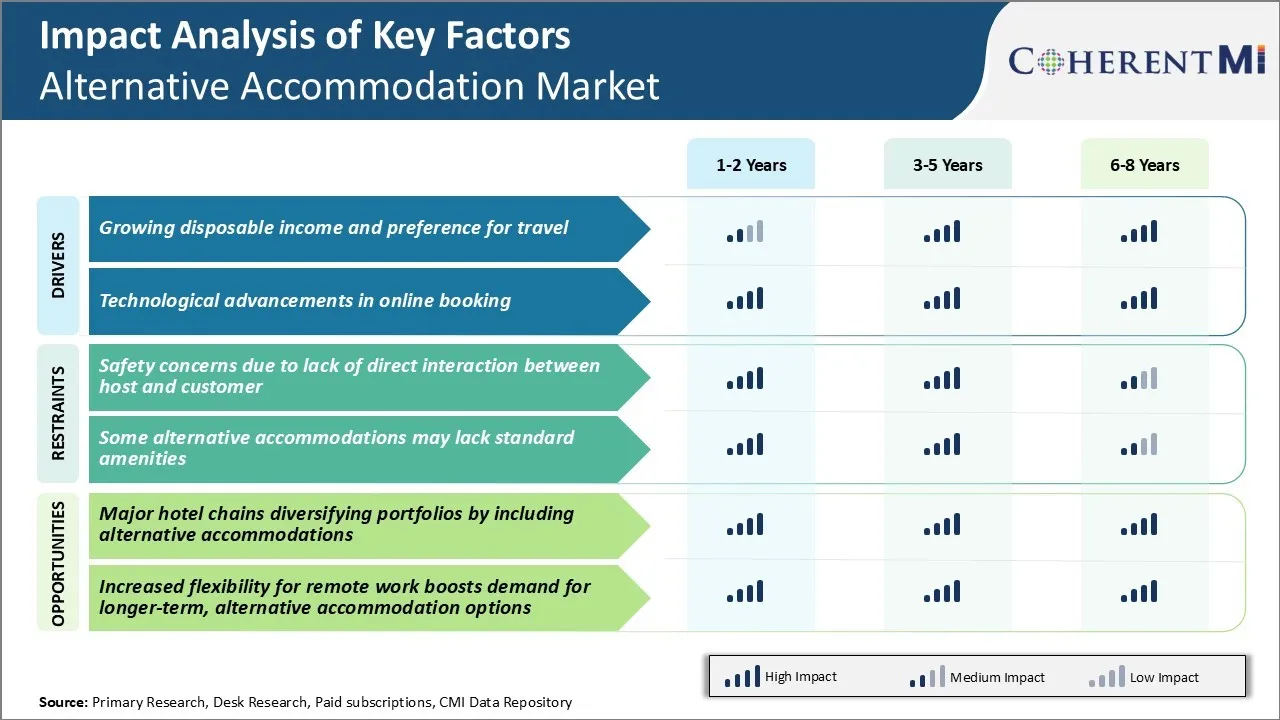Alternative Accommodation Market Trends
Market Driver - Growing Disposable Income and Preference for Travel
Alternative accommodations have filled an important niche by offering lower nightly rates and sometimes overall travel costs. Young professionals and families in particular are gravitating towards alternative accommodations that allow them to enjoy unique, local experiences without breaking the bank.
Students and backpackers have long favored hostels for their social atmosphere and value. But now even couples and groups of friends are choosing vacation rentals and homestays to enjoy like a local on their trip. The convenience of often being located in residential neighborhoods surrounded by cafes, parks and local shops adds to the appeal.
Travelers now want accommodations that offer more than just a bed, and desire engaging with local communities. Interacting with local residents and having an authentic experience of daily life in that destination differentiates alternative accommodations.
With rising interest in slower, experiential and niche types of travel, alternative accommodations are anticipated to climb in popularity. This is expected to contribute to the growth of the alternative accommodation market in the coming years.
Market Driver - Technological Advancements in Online Booking
Technology has radically transformed the travel and tourism industry in recent decades. Online travel agencies and accommodation booking sites have made researching and planning trips tremendously easier. A major boost for alternative accommodation types has been their ability to leverage digital platforms to reach a global customer base.
Whether listing directly on their own website or appearing on aggregator sites, alternative accommodations of all types can now promote their unique properties to travelers worldwide with just a few clicks. Detailed high resolution property photos, calendars indicating real-time availability, and direct instant booking creates a hassle-free user experience.
Communication technologies have further supported alternative accommodation providers. Mobile check-in options allow travelers flexibility without fixed reception times. Positive online reviews have become the new word-of-mouth promotion for alternative accommodation listings. This helps build trust for future guests and increase bookings.
Analytical tools also provide operators valuable market insights to optimize operations. Digitization of the alternative accommodation market has leveled the playing field, allowing players to flourish by connecting with new audiences through online distribution in a cost-effective manner.

Market Challenge - Safety Concerns Due to Lack of Direct Interaction Between Host and Customer
One of the major challenges facing the alternative accommodations market is safety concerns arising from the lack of direct interaction between hosts and customers. Both hosts and guests have expressed worries about personal safety, theft, property damage, and other issues when staying with an unknown party.
While many hosts and guests have positive experiences using alternative accommodation services, negative instances that receive media attention have raised questions about adequate safeguards. Screening of users and reviews/ratings systems can only mitigate risk to a certain extent.
Ensuring robust identity verification of users and emergency response protocols are important to address this challenge and boost confidence in the overall safety and security standards of the sharing platform. More also needs to be done to educate both host and guest communities about respecting each other's privacy and property.
Market Opportunity - Major Hotel Chains Diversifying Portfolios by Including Alternative Accommodations
One significant opportunity for the further growth of the alternative accommodations market is major hotel chains beginning to diversify their portfolios by including alternative accommodation properties.
Recognizing the rising popularity of shared homes and unique venues among certain traveler segments, brands like Marriott, Hilton, and Hyatt have started experimenting with partnership models to list alternative properties on their platforms and apps. This allows them to participate in the fast-growing alternate accommodations space while leveraging their existing customer loyalty programs, reservation systems, and hospitality service standards.
Integrating options like homes, apartments, and hostels alongside traditional hotels gives these large chains a more complete offering for different traveler missions and budgets. It also enables property hosts to gain access to the huge corporate and leisure customer bases of leading hotel companies. As major players increasingly embrace the alternative accommodations sector, its viability and acceptance are poised to reach new heights.